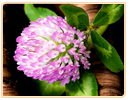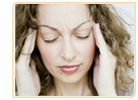Red Clover Side Effects
 Despite its health benefits, red clover can cause various side effects because of its phytoestrogen compounds. Phyto-estrogenic herbs are found in many naturally-occurring plants, just because they are natural doesn't mean they are safe. Red clover alters the level of estrogen in the body and when a change occurs in the natural balance of the body's chemicals, dangerous side effects may occur. Despite its health benefits, red clover can cause various side effects because of its phytoestrogen compounds. Phyto-estrogenic herbs are found in many naturally-occurring plants, just because they are natural doesn't mean they are safe. Red clover alters the level of estrogen in the body and when a change occurs in the natural balance of the body's chemicals, dangerous side effects may occur.
Red clover�s effects are more profound when its active ingredient - isoflavone - is taken in an overly-concentrated form, such as in a liquid tincture.
In the event of side effects occurring due to consuming red clover, medical advice should be sought. Examples of such side effects are explained below.
Side Effects of Using Red Clover
The most common red clover side effects are also the least serious, and generally do not necessitate medical attention. These are:
 . Headaches . Headaches
. Muscle pain
. Nausea
. Allergic reactions
Side effects can sometimes occur in the form of allergic reactions and are usually evident by the presence of hives (itching or swelling) around the throat. Other side effects include wheezing or difficulty breathing.
In rare cases, side effects can be more serious, and, even life-threatening. These are detailed below:
Liver Damage: Taking red clover carries with it the risk of liver damage. This herb is a blood thinner and it stops blood clots from forming. These red clover effects are especially beneficial to those at risk of a heart attack, stroke or aneurism. People on blood-thinning drugs, should not take red clover because its properties can make the blood too thin, causing internal bleeding.
Red clover�s effects on the liver can be identified by the following symptoms:
 . Abdominal pain on the upper-right side of the stomach . Abdominal pain on the upper-right side of the stomach
. Yellow marks around the whites of the eyes or skin
. Dark urine or high liver enzymes (this symptom can only be detected via a blood test.)
Abnormal Vaginal Bleeding: Because red clover is a phyto-estrogenic herb, its estrogen-like effects on the body may cause the lining of the uterus to overgrow and become cancerous. One way to spot this condition is the appearance of abnormal vaginal bleeding.
Possible Infertility: Studies of grazing animals that consume red clover have shown that large doses may be linked to infertility. This red clover effect has not yet been studied in humans, so the possibility of infertility cannot be ruled out.
There are other side effects, which may affect those suffering from specific health conditions. Please read on to find out more.
Interactions Between Red Clover and Health Conditions
Cancer: Red clovers� cancer benefits are such that it is known to prevent some types of cancer, but it also might cause or help advance other types. For example, the herbs �estrogen-like effects may cause the lining of the uterus to overgrow and become cancerous. Also, red clover may interfere with the effects of cancer-treating drugs like Tamoxifen.
Diabetes: It is likely that red clover will lower blood sugar levels. This is harmful for diabetics, as it also affects their body's abilities to process drugs that combat low blood sugar.
 Those who are Pregnant, Breast-Feeding, Undergoing Hormone Therapy or Taking Birth Control Pills: Red clovers� properties can have significant effects on the production of estrogen-like chemicals in the body.. Subsequently, it is an inadvisable herb for those who are undergoing these life stages or receiving these medications. Those who are Pregnant, Breast-Feeding, Undergoing Hormone Therapy or Taking Birth Control Pills: Red clovers� properties can have significant effects on the production of estrogen-like chemicals in the body.. Subsequently, it is an inadvisable herb for those who are undergoing these life stages or receiving these medications.
People on Blood-Thinning Drugs: Red clover is a blood thinner that prevents blood clots from forming, and such effects are particularly beneficial for those at risk of a heart attack, stroke or aneurism. While the thinning of the blood is good for these and other healthy people, those on blood-thinning drugs should not take red clover because it can make the blood too thin and cause internal bleeding. Red clover should also be taken with caution by people using other herb supplements such as gingko, ginger, garlic, or vitamin-E because these herbs also possess blood thinning properties.
 Some Menopause Symptoms: As a phytoestrogenic herb, red clover adds estrogen-like hormones to the body. Since menopause is characterized by lowered and weak levels of estrogen, red clovers� isoflavones have long been used to ease the symptoms of menopause. These symptoms include hot flashes, night sweats, and loss of bone density. Studies have shown that it also improves cardiovascular health and lowers the bone density loss of menopausal women. Some Menopause Symptoms: As a phytoestrogenic herb, red clover adds estrogen-like hormones to the body. Since menopause is characterized by lowered and weak levels of estrogen, red clovers� isoflavones have long been used to ease the symptoms of menopause. These symptoms include hot flashes, night sweats, and loss of bone density. Studies have shown that it also improves cardiovascular health and lowers the bone density loss of menopausal women.
Red clovers� effects on menopausal women are not fully understood and continue to be investigated. To learn more about red clover and menopause, please continue reading the next section.
Conclusions about Red clover
Red clover is great for treating some menopause symptoms, but has recently been criticized because it adds artificial hormones to the body. In so doing, red clover can trigger side effects including serious conditions such as breast cancer.
Other alternative treatments are just as effective as red clover, but without the side effects. Non-estrogenic herbs, for example, are a great option for treating menopause symptoms. Read more in the following article.
Which herb should women try? Today women are looking for relief from their menopause symptoms with herbs. Phytoestrogenic herbs and non-estrogenic herbs are good in relieving menopause symptoms, but recent studies show that non-estrogenic herbs have no side effects because they help the body to produce its own hormones instead of introducing hormones like the phytoestrogenic ones. Learn more about non-estrogenic herbs for menopause.
| 

